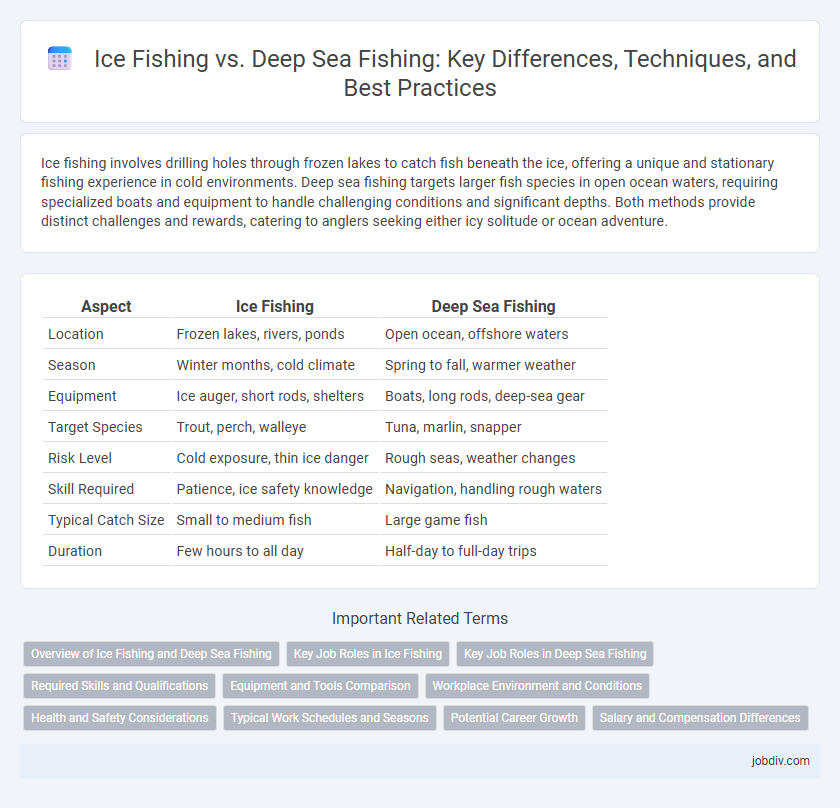Ice fishing involves drilling holes through frozen lakes to catch fish beneath the ice, offering a unique and stationary fishing experience in cold environments. Deep sea fishing targets larger fish species in open ocean waters, requiring specialized boats and equipment to handle challenging conditions and significant depths. Both methods provide distinct challenges and rewards, catering to anglers seeking either icy solitude or ocean adventure.
Table of Comparison
| Aspect | Ice Fishing | Deep Sea Fishing |
|---|---|---|
| Location | Frozen lakes, rivers, ponds | Open ocean, offshore waters |
| Season | Winter months, cold climate | Spring to fall, warmer weather |
| Equipment | Ice auger, short rods, shelters | Boats, long rods, deep-sea gear |
| Target Species | Trout, perch, walleye | Tuna, marlin, snapper |
| Risk Level | Cold exposure, thin ice danger | Rough seas, weather changes |
| Skill Required | Patience, ice safety knowledge | Navigation, handling rough waters |
| Typical Catch Size | Small to medium fish | Large game fish |
| Duration | Few hours to all day | Half-day to full-day trips |
Overview of Ice Fishing and Deep Sea Fishing
Ice fishing involves fishing through holes drilled in frozen lakes and rivers, typically requiring specialized gear like ice augers, shelters, and insulated clothing to withstand cold temperatures. Deep sea fishing takes place in the ocean, targeting larger species such as marlin, tuna, and swordfish using heavy-duty rods, reels, and boats designed to navigate deep waters and handle strong ocean currents. Both activities offer unique challenges and rewards depending on the environment and fish species targeted.
Key Job Roles in Ice Fishing
Ice fishing requires specialized roles such as setting up and maintaining ice shelters, drilling precise holes in thick ice layers, and monitoring fish activity beneath frozen surfaces. Operators often use sonar technology to locate fish and ensure safety by assessing ice thickness and weather conditions. These tasks contrast with deep-sea fishing, where navigation and boat handling dominate, emphasizing ice fishing's unique skill set in cold environments.
Key Job Roles in Deep Sea Fishing
Deep sea fishing requires specialized roles such as deckhands who manage nets and lines, captains who navigate and ensure safety, and engineers who maintain the vessel's mechanical systems. Skilled fishery biologists often assist in identifying sustainable catch limits and monitoring marine ecosystems. These positions demand expertise in navigation, marine biology, and equipment operation to optimize catch efficiency and comply with regulations.
Required Skills and Qualifications
Ice fishing requires knowledge of safe ice conditions, proficiency in using specialized equipment like augers and ice shelters, and an understanding of fish behavior in cold environments. Deep sea fishing demands advanced navigation skills, experience with heavy-duty fishing gear, and knowledge of ocean currents and weather patterns to ensure safety and successful catches. Both types require patience and familiarity with local regulations, but deep sea fishing often calls for formal training or certification in boat handling and safety protocols.
Equipment and Tools Comparison
Ice fishing requires specialized equipment such as ice augers to drill holes, portable shelters for protection against cold temperatures, and compact rods designed for vertical fishing through ice. Deep sea fishing involves heavier gear including robust rods and reels capable of handling large fish, deep-sea fish finders, and sturdy boats equipped to navigate open waters. The stark contrast in tools reflects the differing environments and target species, with ice fishing focusing on simplicity and warmth while deep sea fishing emphasizes durability and advanced technology.
Workplace Environment and Conditions
Ice fishing requires anglers to endure harsh, freezing temperatures on frozen lakes, often within small, insulated shelters designed to protect against extreme cold and wind. Deep sea fishing involves battling unpredictable ocean waves, salt spray, and exposure to strong sun, requiring sturdy boats equipped with safety gear and space for handling larger marine species. Both environments demand specialized clothing and equipment to ensure safety and comfort in vastly different weather and water conditions.
Health and Safety Considerations
Ice fishing requires careful attention to cold exposure risks, such as hypothermia and frostbite, necessitating proper insulated clothing and safety gear. Deep sea fishing poses hazards like severe weather, rough waters, and potential seasickness, making life jackets, emergency communication devices, and weather monitoring essential. Both activities demand thorough preparation and awareness to ensure health and safety amid environmental challenges.
Typical Work Schedules and Seasons
Ice fishing typically occurs during the winter months when lakes freeze over, with anglers often starting early in the morning and fishing throughout the daylight hours. Deep sea fishing is generally a seasonal activity in warmer months, requiring early morning departures to maximize daylight and ocean conditions for catching larger fish. Both practices demand adaptation to their specific environmental conditions, influencing work schedules and gear preparation.
Potential Career Growth
Ice fishing offers seasonal job opportunities primarily in colder regions with a focus on guiding tourists and selling specialized equipment, limiting year-round career growth. Deep sea fishing presents broader career paths such as commercial fishing, maritime navigation, and marine biology, with potential for higher income and global mobility. Both fields require specialized skills, but deep sea fishing generally provides more consistent employment and advancement in the fishing industry.
Salary and Compensation Differences
Ice fishing typically offers lower salary opportunities due to its seasonal, part-time nature and limited commercial demand, with average earnings ranging from $25,000 to $40,000 annually. In contrast, deep sea fishing provides higher compensation, often exceeding $50,000 per year, driven by the commercial scale, longer trips, and higher risk factors involved. Benefits in deep sea fishing may include profit sharing and bonuses based on catch volume, which are rarely available in ice fishing occupations.
Ice Fishing vs Deep Sea Fishing Infographic

 jobdiv.com
jobdiv.com